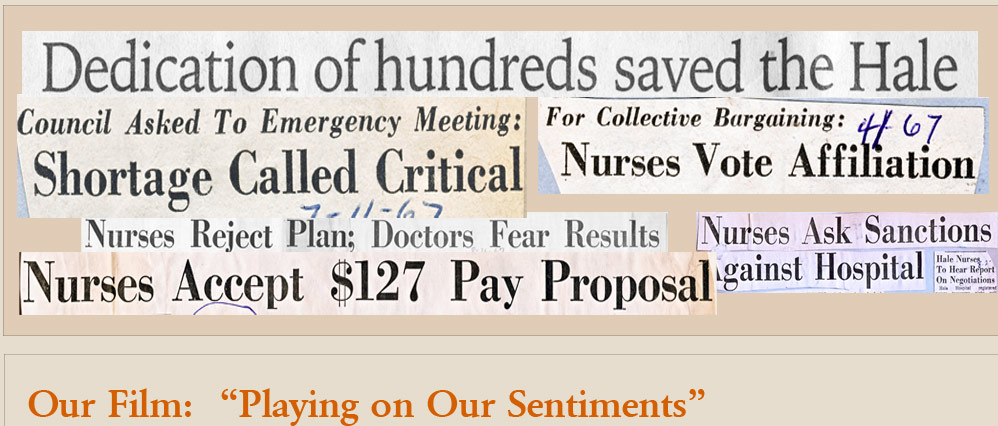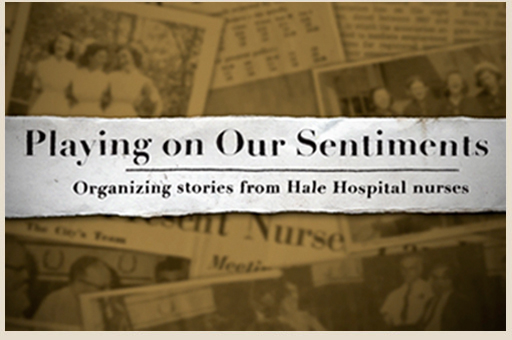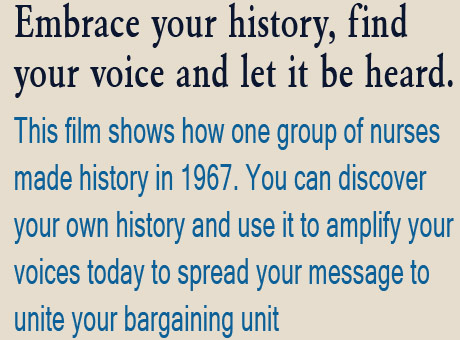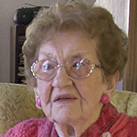 |
|||||||||||||||||||
 |
|||||||||||||||||||
 |
 |
||||||||||||||||||
 |
 |
 Testimonials"This is a terrific documentary wonderfully told about sowing the seeds of collective bargaining for nurses in Massachusetts when to do so was revolutionary. The pioneering efforts by the courageous nurses at Hale Hospital were profoundly important for nurses, the nursing profession, patients and for American women. More stories please." "This powerful film gives the history of nurses organizing in one hospital told by the nurses themselves. Across three generations it tells how their collective action and solidarity enabled them to build a strong, democratic union that advocated for themselves as workers and professionals and for their patients. An excellent film for union workshops or a labor history course." "A short but important video that vividly presents how nurses find their voice to "make a difference" for their own work lives and the lives of their patients. It provides inspiration for action for those interested in women's studies, labor history and the social and health sciences." "This film is a 'must see' for nursing students. It is hard for our students to have an appreciation for the working conditions that were common in the 1960s. This well-made film brings that history to life. I highly recommend it." |
|||||||||||||||||
This 12 minute documentary "Playing on Our Sentiments" shows how the nurses at Hale Hospital in Haverhill, MA won their first union contract. Meet Marion Cronin, the nurse who led this bargaining unit and see original photos and headlines from the 1960s. The story, told through interviews with Marion and two of her younger colleagues, shows us how to stand up and make our voices heard. How To Get This FilmOrder a copy of this film by contacting the Masssachusetts Nurses Association: Why I Made This Filmby Roslyn (Roz) FeldbergI always think it's helpful to know your own history. Most people, including nurses, are not taught labor history anywhere in their education, and without knowing that history, having a union may just seem inevitable. But it is not. It is swimming against the tide. Once you know that history, you can think about how to make your union what you want it to be. So before I "retired" from the MNA, I arranged to teach a course in Women's Labor History for the nurses. The course began with a wonderful group of nurses plus a couple of women from the MNA staff. As we headed into the 3rd week of talking about women organizing and fighting for their rights, their dignity and better wages and working conditions in the textile mills of New England and the garment shops of New York, one of the nurses asked if I was going to teach them about nurses organizing in Massachusetts. I said I was trying to find the information (you can read the "backstory" below), but I hadn't been able to find it yet. I never did find it... so I started thinking about how to capture that history. I came up with a plan to do some oral histories with older nurses. Jeanine Hickey, one of the interviewees in the film, offered to introduce me to Marion Cronin, the 'star' of this film. And then, several people said, "you know nurses don't have time to read a bunch of articles. If you want nurses to learn about this, you'd better do a video." A couple of days of thinking about this convinced me that they were right... but I didn't know anything about doing a video. Enter Amanda Wallas, the videographer and editor for the documentary. As we were making this documentary, I began to think about other ways for nurses and other workers to capture their history. If you want some suggestions, just click here. And if you have some ideas to add, please send them to me at: Roslyn Feldberg, email:rozwrites2016@gmail.com. |
|||||||||||||||||||
Hale LeadersSeveral nurses who were part of the organizing effort at the Hale Nurses Union participated in the making of this film. You can read more in the "Backstory" section, below.
BackstoryIn the immediate aftermath of WWII, many groups of workers, whose wages had been limited by the wage and price control boards during the war, began to press for higher wages and a higher standard of living. By 1954, the nurses at Hale Hospital were among them. They organized a nurses' council and had elected representatives. In March of 1954, the nurses were pressing for improvements in their wages and hours and presented their "demands" to the hospital trustees and the director of the hospital. Without regard to those demands, the hospital proposed that the City pay the nurses as follows: charge nurses, $55 to $59 a week and general duty nurses, $50-$56 a week. Annually those ranges were $2,860-3,068 and $2,600-2,912. Feeling that their voices were not being heard, the nurses voted to hire an attorney to help them press their demands. The director of the hospital, Dr. Robert Lambert, spoke against the hiring and then telephoned Mrs. Harold Baumann, one of the council members to "advise" her not to let their attorney make any statement to the press, saying that such a statement might "jeopardize chances of getting benefits and 'antagonize the board of trustees.'" Mrs. Baumann and her colleagues viewed this as intimidation and denounced it in the press as"an attempt to silence me." After this incident the director made statements implying that the elected leaders did not really represent the nurses. With the support of their members, the nurses' leaders sent a five column letter to the local paper reviewing the history of the entire process. That letter made clear that the leaders were elected by their peers and that all were united in trying to get a 40 hour week. Then they outlined their three month effort to meet with the trustees or the director, without success. Finally they explained that the trustees rejected the forty hour week and sent the proposed pay ranges to the City Council without even informing the nurses of their decision. It was at that point, that the nurses hired their attorney, a man well-known in the city. The director responded to the nurses' letter, accusing the leaders of "misleading" their peers into "unethical and unfortunate actions". The nurses wrote that their actions were taken only after votes by the entire membership and that they took action only as representatives, not as individuals. The nurses ended their letter by assuring the public that: "We shall continue to give good patient care always, for this is our primary concern." The outcome of this confrontation is not clear, although the forty hour week was not achieved for many years. What is clear is that the nurses and their elected leaders had become willing to stand up for themselves. Three years later, forty-eight full-time nurses resigned, effective June 1, 1957, threatening closure of the hospital. This time, they had the support of the hospital administration. After three years of training and many years of service, the nurses were, according to the president of the hospital advisory board, "being asked to work for less than factory workers." He went on to say: "The average person doesn't have the slightest idea of what it means to be a good nurse. We can't do a thing without you." Despite the support of the Hale Hospital Board of Trustees, the medical staff, the Haverhill Ministers' Association, and the Greater Haverhill Chamber of Commerce, the City Council and the mayor twice refused to give the nurses a higher wage increase than the $4-a-week increase that was being given to all other city employees. The mayor, Joseph L. Willett, led the opposition to a different wage plan for nurses. The Board of Trustees voted to raise $10, 000 in private funds to pay the nurses an "incentive" above their regular salaries and asked the nurses to postpone their resignations to September 1, to allow time for the fund-raising. The nurses agreed. The chairman of the hospital trustees acknowledged their loyalty to the hospital: "The action exemplifies their dedication to the welfare of patients. This is especially so when we realize that they need go no farther than... Beth Israel Hospital to receive up to $21 a day for their services." The nurses maintained their organization as an informal 'union' and sought advice from the Massachusetts Nurses Association(MNA) on several occasions, but as city employees they did not have collective bargain rights under Massachusetts or federal law at that time. After a long debate, the members of MNA voted to fight for nurses collective bargaining rights in Massachusetts and helped to pass a law in 1964 granting those rights to nurses working for city hospitals and not-for-profit hospitals in 1965. And soon thereafter, in 1967, the nurses at Hale Hospital formed their bargaining unit: the MNA Hale Professional Nurses Union. This film tells their story. |
|||||||||||||||||||
TEAM | TALKS | FILM | FAQ/LINKS | CONTACT US | BLOG | SITEMAP


